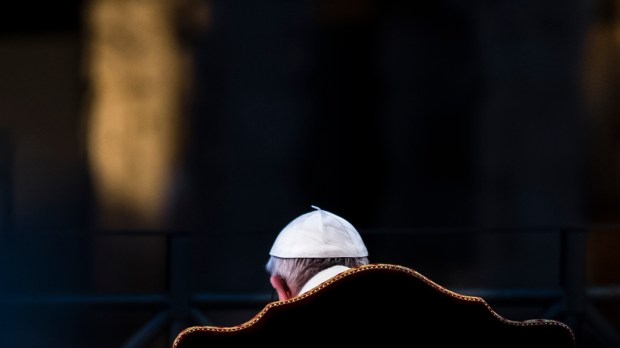STATIONS OF THE CROSS 2020
Meditations from Padua Prison
Introduction
The meditations on the Stations of the Cross this year were prepared by the chaplaincy of the “Due Palazzi” House of Detention in Padua. Fourteen people were invited by Pope Francis to meditate on the Passion of our Lord Jesus Christ, bringing it to bear on their own situations. Those invited included five prisoners, a family that was the victim of a murder, the daughter of a man given a life sentence, a prison teacher, a civil magistrate, the mother of a prisoner, a catechist, a volunteer religious brother, a prison guard and a priest who was accused and then finally acquitted after eight years in the justice system.
Accompanying Christ on the Way of the Cross, with the raw voices of those who live behind the walls of a prison, is an opportunity to view the great battle between life and death, to discover how the threads of good and evil inevitably intertwine. Contemplating Calvary from behind bars is to believe that an entire life can be played out in a few moments, as happened to the good thief. All it takes is to fill those moments with truth: contrition for sins committed, the realization that death is not for ever, the certainty that Christ is the innocent man unjustly mocked. Everything is possible for those who believe, because even in the darkness of prison there resounds the proclamation full of hope: “For with God nothing will be impossible” (Lk 1:37). If someone holds out to them a hand, those capable of the most horrendous crimes can undergo the most unexpected resurrection. We can be certain that “even when we tell of evil, we can learn to leave room for redemption; in the midst of evil, we can also recognize the working of goodness and give it space” (Message of Pope Francis for World Communications Day 2020).
In this way, the Via Crucis becomes a Via Lucis.
The texts, compiled by the chaplain, Father Marco Pozza and volunteer Tatiana Mario, were written in the first person, but it was decided not to attribute names, for those who took part in this meditation wanted to lend their voice to all those throughout the world who are in the same situation. This evening, in the silence of prison, the voice of one wishes to become the voice of all.
Let us pray.
O God, Almighty Father,
in Jesus Christ your Son
you assumed the wounds and sufferings of humanity.
Today I have the courage to beseech you, like the good thief: “Remember me!”
I am here, alone before you, in the dark of this prison: poor, naked, hungry and despised, and I ask you to pour out upon my wounds the balm of forgiveness and consolation, and the wine of a solidarity that strengthens the heart.
Heal me with your grace and teach me hope in the midst of despair.
My Lord and my God, I believe; help my unbelief.
Merciful Father, continue to trust in me, to give me fresh opportunities,
to embrace me in your infinite love.
With your help and by the gift of the Holy Spirit, I too will be able to recognize you and serve you in my brothers and sisters.
Amen.
First Station
Jesus is condemned to death
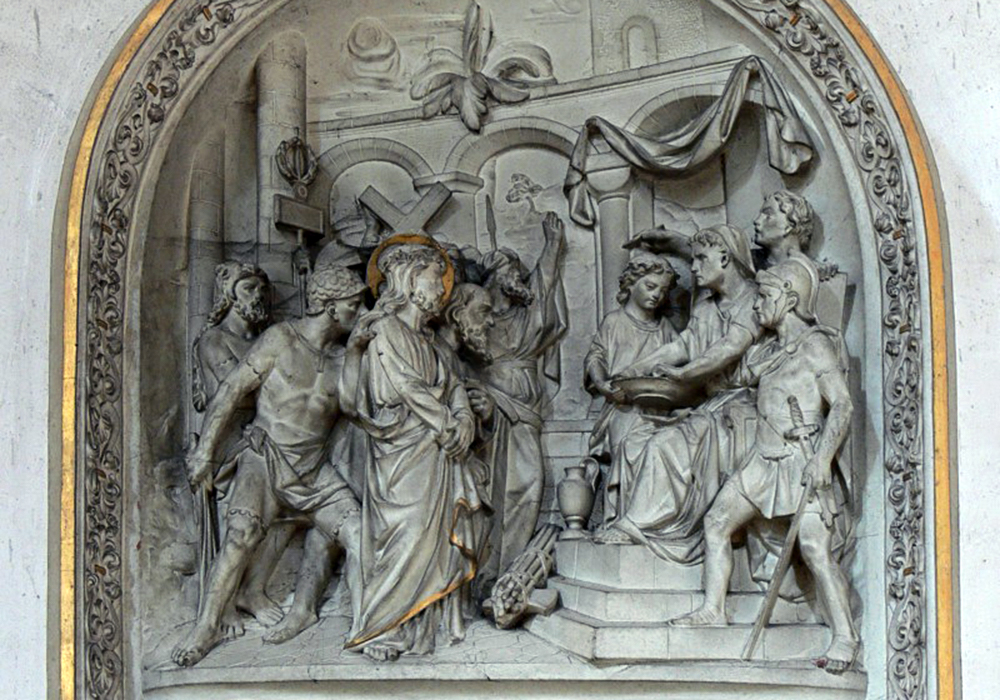
(Meditation by a prisoner serving a life sentence)
Pilate addressed them once more, desiring to release Jesus; but they shouted out, “Crucify, crucify him!” A third time he said to them, “Why, what evil has he done? I have found in him no crime deserving death; I will therefore chastise him and release him.” But they were urgent, demanding with loud cries that he should be crucified. And their voices prevailed. So Pilate gave sentence that their demand should be granted. He released the man who had been thrown into prison for insurrection and murder, whom they asked for; but Jesus he delivered up to their will(Lk 23:20-25).
Many times that cry, “Crucify him, crucify him!” is shouted out in court-rooms and in newspapers. It is a cry I even heard against me: I was condemned, together with my father, to a life sentence. My crucifixion began when I was a child: when I think back I see myself curled up on the bus that took me to school, sidelined because of my stutter, with no friends. I started to work when I was small, without having a chance to study: ignorance prevailed over innocence. Then bullying stole what was left of childhood from this boy born in Calabria during the 1970s. I am more like Barabbas than Christ, yet the harshest condemnation remains that of my own conscience: at night I open my eyes and I desperately search for a light that will shine upon my story.
Alone in my cell, when I re-read the pages of the Passion of Christ, I burst into tears: after 29 years in prison I have not yet lost the capacity to cry, to feel ashamed of my past history and of the evil I did. I feel like Barabbas, Peter and Judas in one single person. I am repelled by my past, even though I know it is my story. I have lived for years under the restrictive conditions of Article 41b of the Prison Administration Act and my father died under the same conditions. Many times at night I heard him crying in his cell. He tried to hide it, but I knew. We were both plunged into deep darkness. In that non-life, however, I was always searching for something that would be life: strange to say, prison was my salvation. If, for some, I am still Barabbas, that does not make me angry: I know in my heart that the Innocent One, condemned like me, came to find me in prison to teach me about life.
Lord Jesus, despite the uproar, we glimpse you among the crowds shouting for you to be crucified; perhaps we too are among them, blind to the evil of which we are capable. From our cells we want to pray to your Father for all those who, like you, are condemned to death and for all those who would substitute their own for your supreme judgment.
Let us pray.
O God, lover of life, in the sacrament of Reconciliation, you always give us a new opportunity to experience your infinite mercy. We ask you to grant us the gift of wisdom so that we can see every man and woman as a temple of your Spirit and respect their inviolable dignity. Through Christ our Lord. Amen.
Second Station
Jesus takes up his Cross
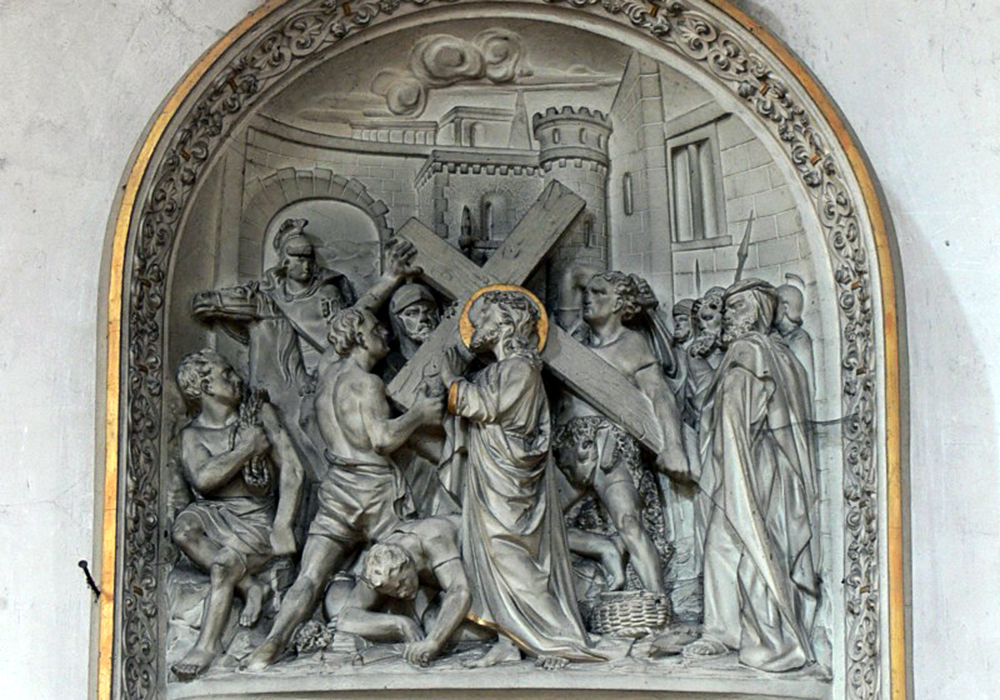
(Meditation by two parents whose daughter was murdered)
The soldiers led him away inside the palace (that is, the praetorium); and they called together the whole battalion. And they clothed him in a purple cloak, and plaiting a crown of thorns they put it on him. And they began to salute him, “Hail, King of the Jews!” And they struck his head with a reed, and spat upon him, and they knelt down in homage to him. And when they had mocked him, they stripped him of the purple cloak, and put his own clothes on him. And they led him out to crucify him(Mk 15:16-20).
During that horrible summer our life as parents died together with that of our two daughters. One of them was murdered along with her closest friend by the blind violence of a ruthless man; the other, who miraculously survived, was forever deprived of her smile. Ours was a life of sacrifices based on work and family. We taught our children to respect others and to value serving the poor. We often ask ourselves: “Why did it happen to us, this evil which engulfed us?”. We find no peace. Nor is justice, in which we had always trusted, able to relieve these deep wounds: our condemnation to suffering will never end.
Time has not eased the weight of the cross placed upon our shoulders: we are unable to forget our daughter who is no longer with us. We are elderly, more and more vulnerable and victims of the worst pain that can exist: surviving the death of a daughter.
This is difficult to say, but at the moment in which despair seems to take over, the Lord in different ways comes to meet us, giving us the grace to love one another as spouses, and to support one another, hard as it is. He invites us to keep the door of our home open to the poor and the despairing, welcoming whoever knocks, even if only for a bowl of soup. The commandment to perform acts of charity is for us a kind of salvation: we do not want to surrender to evil. God’s love is truly capable of renewing life because, before us, his Son Jesus underwent human suffering so as to experience true compassion.
Lord Jesus, it pains us to see you struck, mocked and stripped, an innocent victim of inhumane cruelty. On this night of sorrow, we plead with your Father and entrust to him all those who have endured violence and evil.
Let us pray.
O God, our justice and our redemption, who gave us your only Son and glorified him on the throne of the cross, instil your hope in our hearts so that we can recognize you present in the dark moments of our life. Comfort us in every affliction and support us in our trials as we await the coming of your kingdom. Through Christ our Lord. Amen.
Third Station
Jesus falls for the first time
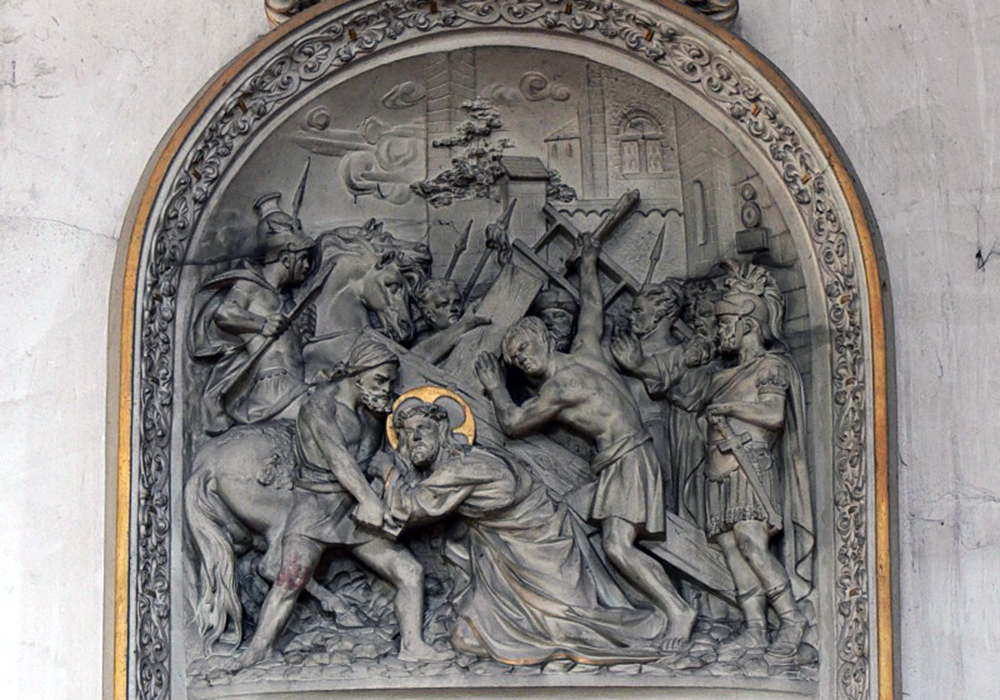
(Meditation by a prisoner)
Surely he has borne our griefs and carried our sorrows; yet we esteemed him stricken, struck down by God, and afflicted. But he was wounded for our transgressions, he was bruised for our iniquities; upon him was the chastisement that made us whole, and with his stripes we are healed. All we like sheep have gone astray; we have turned every one to his own way; and the Lord has laid on him the iniquity of us all(Is 53:4-6).
It was the first time that I fell, but for me that fall was death: I took someone’s life. It only takes a day to pass from a blameless life to committing an act which encompasses the violation of all the commandments. I feel like a modern version of that thief who implored Christ with the words “Remember me!”. I imagine him less a penitent than someone conscious of being on the wrong path. From my childhood I remember the cold and hostile environment in which I grew up. All it took was for me to figure out someone’s weakness in order to transform it into a kind of entertainment. I was looking for real friends, I wanted to be accepted for who I was, but I was unable. I resented the happiness of others, I felt hamstrung, they asked of me only sacrifices and to obey the rules: I felt like a stranger to everyone and I sought revenge at all costs.
I hadn’t realized that evil was slowly growing inside me. Until, one evening, my own hour of darkness struck: in a second, like an avalanche, the memories of all the injustices I had suffered in life exploded. Anger killed my kindness, I committed an evil immensely greater than any of those that I had received. Then, in prison the ill-treatment by others led me to self-hatred: I was close to ending it all, I had reached the limit. I had also ruined my family: because of me they lost their name and respectability; they had become merely the family of a murderer. I make no excuses and seek no reductions, I will serve my sentence to the end because in prison I have found people who have given me back the faith I had lost.
My first fall was failing to realize that goodness exists in this world. My second, the murder, was really its consequence, for I was already dead inside.
Lord Jesus, you, too, fell to the ground. Perhaps your first fall was the hardest because it was entirely new: the impact was hard and left you shaken. We entrust to your Father all those who are so caught up in themselves that they are unable to acknowledge the sins they have committed.
Let us pray.
O God, you raised mankind up when we had fallen. We ask you to come to help us in our weakness and to grant us eyes to see the signs of your love everywhere in our daily lives. Through Christ our Lord. Amen.
Fourth Station
Jesus meets his Mother
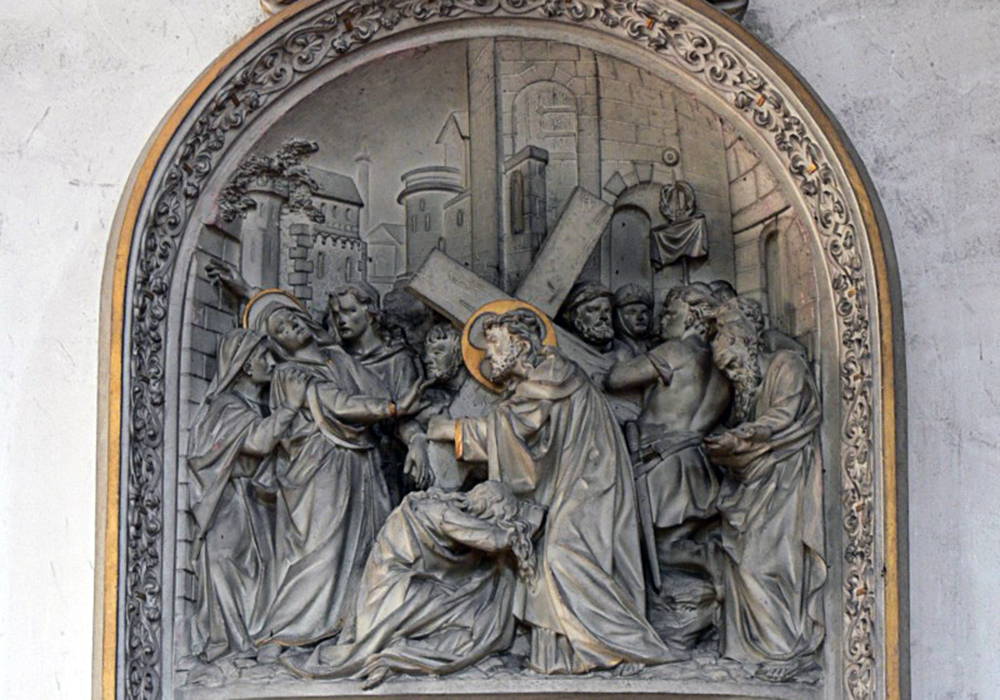
(Meditation by the mother of a prisoner)
Standing by the cross of Jesus were his mother, and his mother’s sister, Mary the wife of Clopas, and Mary Magdalene. When Jesus saw his mother, and the disciple whom he loved standing near, he said to his mother, “Woman, behold, your son!” Then he said to the disciple, “Behold, your mother!” And from that hour the disciple took her to his own home(Jn 19:25-27).
Not for a moment was I tempted to abandon my son in the face of his sentence. The day he was arrested changed our entire life: the whole family went into prison with him. Today people’s judgment remains implacable: like a sharp knife, fingers pointed are against all of us, increasing the suffering we already bear in our hearts.
The wounds grow with each passing day, they take our breath away.
I feel Mother Mary close to me: she helps me not to give into despair and to cope with the pain. I’ve entrusted my son to her: only to Mary can I confide my fears, since she herself experienced them on the way to Calvary. In her heart she knew that her Son would not escape human evil, yet she did not abandon him. She stood there sharing in his suffering, keeping him company by her presence. I think of Jesus looking up, seeing those eyes so full of love, and not feeling alone.
I would like to do the same.
I blamed myself for my son’s sins. I asked forgiveness also for my own responsibility. I beg for the mercy that only a mother is able to experience, so that my son can return to life after having paid for his crime. I pray constantly for him, so that day by day he can grow into a different man, capable once more of loving himself and others.
Lord Jesus, meeting your mother on the way of the cross is perhaps the most moving and most sorrowful of all.
Between your eyes and hers, we place all families and friends who feel pained and helpless before the fate of their loved ones.
Let us pray.
O Mary, Mother of God and Mother of the Church, faithful disciple of your Son, we turn to you and entrust to your loving gaze and to the care of your maternal heart the cry of all humanity which awaits with anguish the day when every tear will be wiped away from their faces. Amen.
Fifth Station
Simon of Cyrene helps Jesus carry the Cross
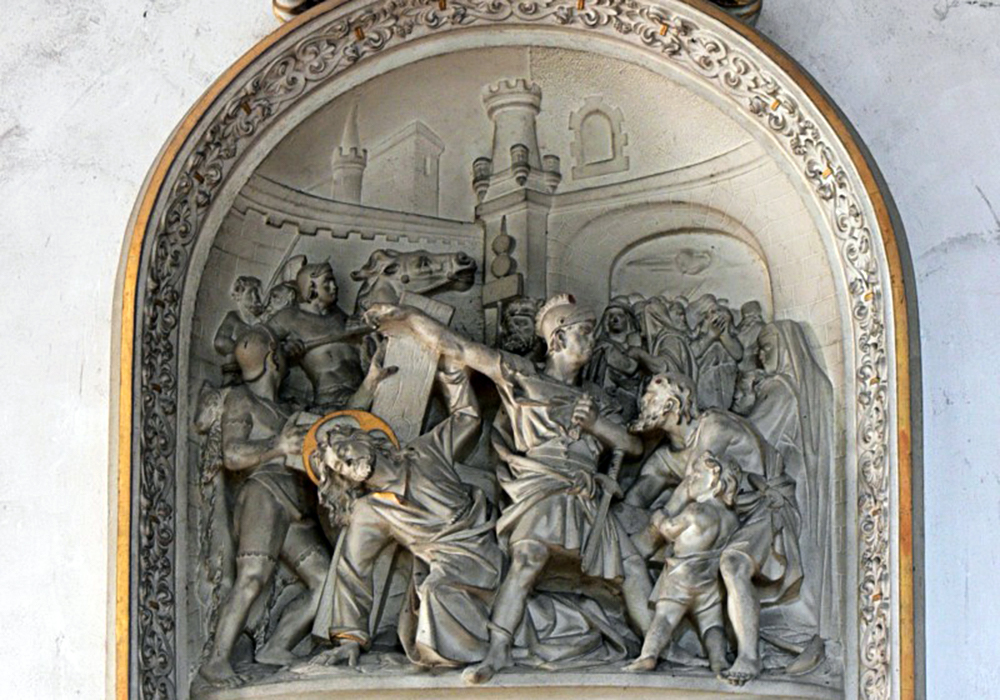
(Meditation by a prisoner)
As they led him away, they seized one Simon of Cyrene, who was coming in from the country, and laid on him the cross, to carry it behind Jesus (Lk 23:26).
With my job I helped generations of children to believe in themselves. Then one day I found myself lying on the ground. It was as if they broke my back: my job was the pretext for a shameful conviction. I entered prison: prison entered my home. Since then I have become an outcast in the city: I have lost my name, I am now known by the crime of which I have been charged, I am no longer the master of my life. When I think about it, that child with worn-out shoes, wet feet, secondhand clothes comes to mind: that child was me, I was once that child. Then, one day, my arrest: three men in uniform, a rigid protocol, the prison that swallowed me alive in its concrete maw.
The cross they placed on my shoulders is a heavy one. Over time I have learned to live with it, to look it in the face, to call it by name: we spend many nights keeping each other company. Inside prisons, Simon of Cyrene is known by everyone: it is the second name of volunteers, of those who mount this Calvary to help carry a cross; they are people who reject the law of the pack and listen to their conscience. Simon of Cyrene, too, is my cellmate: I met him my first night in prison. He was a man who had lived on a bench for years, without affection or income. His only wealth was a box of candies. He has a sweet tooth, but he insisted that I bring it to my wife the first time she visited me: she burst into tears at that unexpected and thoughtful gesture.
I’m growing old in prison: I dream that one day, I will be able to trust others.
To become a Cyrenean, bringing joy to someone.
Lord Jesus, from the moment of your birth to the time you met a stranger who helped you carry your cross, you wanted to depend on our help. We too, like the Cyrenean, desire to be close to our brothers and sisters and to help in offering the Father’s mercy that breaks the yoke that oppresses them.
Let us pray.
O God, defender of the poor and comforter of the afflicted, strengthen us with your presence and help us to bear each day the easy yoke of your commandment of love. Through Christ our Lord. Amen.
Sixth Station
Veronica wipes the face of Jesus
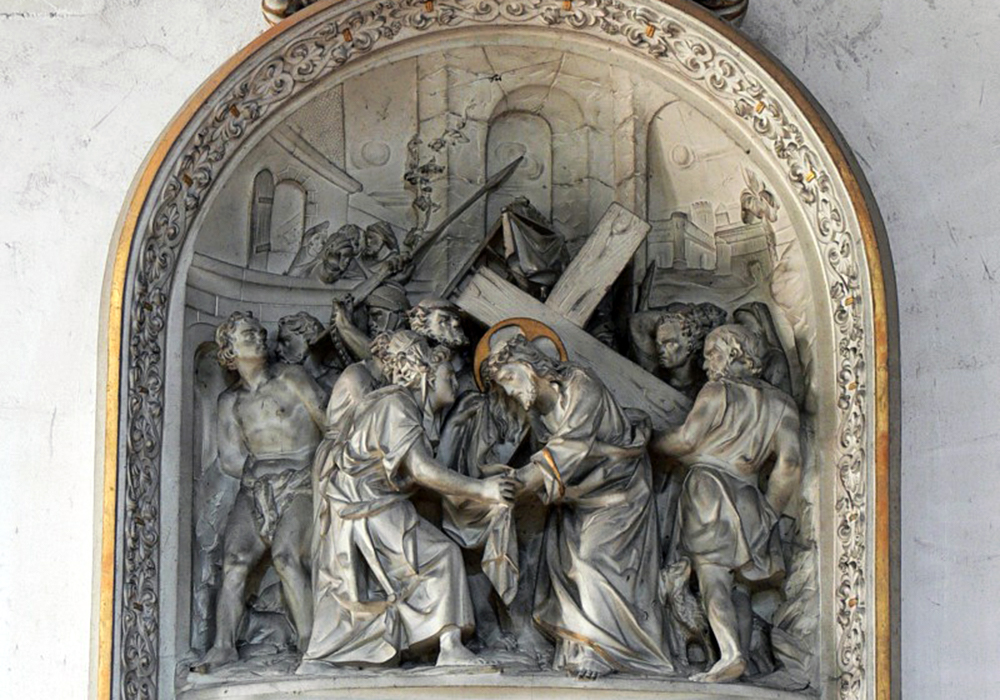
(Meditation by a catechist)
My heart says to you,“Your face, Lord, do I seek”. Hide not your face from me. Turn not your servant away in anger, you who have been my help. Cast me not off, forsake me not, O God of my salvation! (Ps 27:8-9).
As a catechist, I wipe away many tears, letting them flow: they flood uncontrollably from hearts that are broken. Many times I meet despairing souls who, in the darkness of prison, try to find a reason for the evil that to them seems infinite. Their tears are those of defeat and loneliness, of remorse and lack of understanding. I often imagine Jesus here in prison in my stead: how would he wipe away the tears? How would he ease the anguish of these men who feel trapped by what they have become in yielding to evil?
Coming up with an answer is hard, often impossible within the limits of our petty human logic. The way pointed out to me by Christ is to contemplate, without fear, those faces marred by suffering. I am asked to remain there with them, respecting their silence, listening to their pain, and seeking to look beyond prejudice. In the same way that Christ looks at our own weaknesses and limitations with eyes full of love. Everyone, including those in prison, has an opportunity each day to become a new person, thanks to Christ’s look which does not judge, but gives life and hope.
In this way, the tears that fall can become the seed of a beauty that was difficult even to imagine.
Lord Jesus, Veronica had pity on you: she encountered a suffering person and discovered the face of God. In prayer we entrust to your Father the men and women of our times who seek to wipe away the tears of so many of our brothers and sisters.
Let us pray.
O God, true light and source of all light, in weakness you reveal the power and radicalism of love. Imprint your face in our hearts, so that we can recognize you in all human suffering. Through Christ our Lord. Amen.
Seventh Station
Jesus falls for the second time
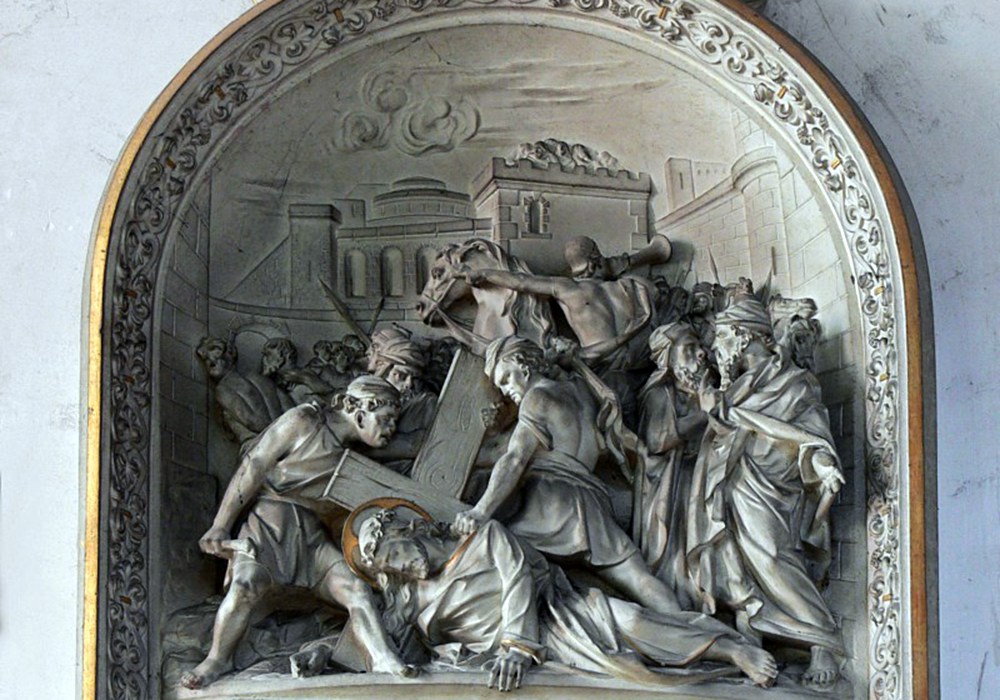
(Meditation by a prisoner)
Jesus said, “Father, forgive them; for they know not what they do”. And they cast lots to divide his garments (Lk 23:34).
In the past, whenever I walked past a prison, I looked the other way: “I will never end up in there”, I said to myself. The times I did look, I felt sadness and darkness: I felt like I was walking past a cemetery of the living dead. Then one day, I ended up behind bars, together with my brother. As if that wasn’t enough, I also brought my father and mother in there. From the foreign country it had been, the prison is now our home: we men were in one cell, our mother in another. I looked at them and I felt ashamed of myself. I no longer feel like I am a man. They are growing old in prison because of me.
I fell twice. The first time was when evil attracted me and I gave in: peddling drugs, in my eyes, was worth more than the work of my father, who was breaking his back ten hours a day. The second was when, after ruining the family, I began to ask myself: “Who am I that Christ should die for me?”. The cry of Jesus – “Father, forgive them; for they know not what they do” – I saw reflected in my mother’s eyes: she took on the shame of all the men of the house to save the family. And I saw it in the face of my father, as he secretly despaired in his cell. Only today can I admit it: in those years I didn’t know what I was doing. Now that I know, I am trying to rebuild my life with the help of God. I owe it to my parents: years ago, they sold all that we had of value because they didn’t want me to live on the street. I owe it above all to myself: the idea that evil can continue to guide my life is intolerable. This is what has become my way of the cross.
Lord Jesus, once again you have fallen to the ground: crushed by my attachment to evil, by my fear of not being able to become a better person. In faith we turn to your Father and pray for all those not yet able to break free from the power of Satan, from all his allurements and his manifold seductions.
Let us pray.
O God, you do not leave us in the darkness and shadow of death. Strengthen us in our weakness, free us from the bonds of evil and shield us by your power, so that we may forever sing of your mercy. Through Christ our Lord. Amen.
Eighth Station
Jesus meets the women of Jerusalem
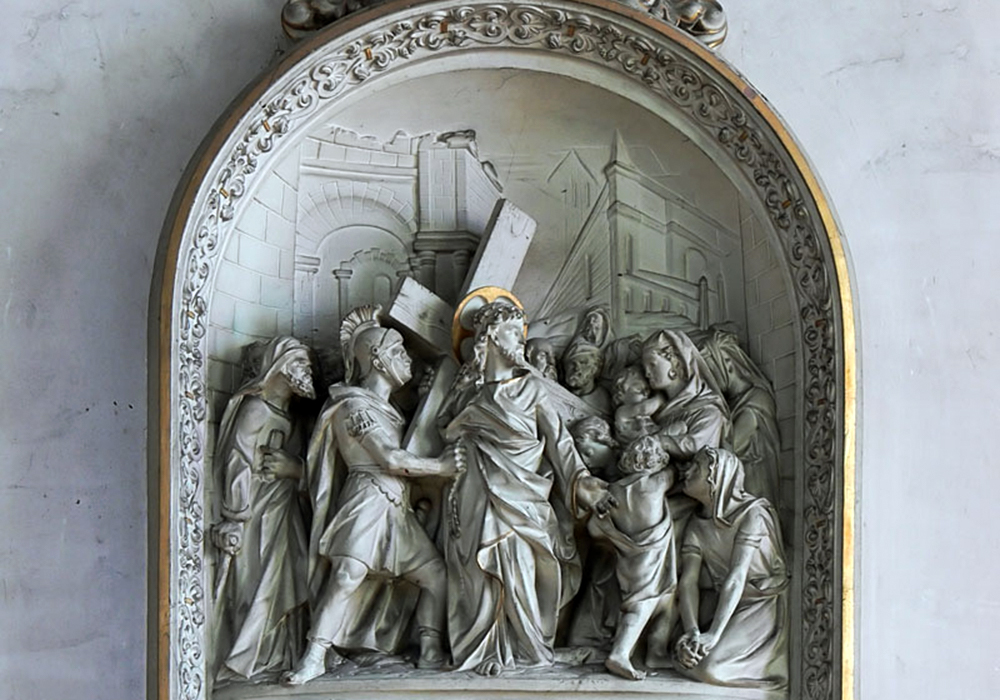
(Meditation by the daughter of a man sentenced to life imprisonment)
There followed him a great multitude of the people, and of women who bewailed and lamented him. But Jesus turning to them said, “Daughters of Jerusalem, do not weep for me, but weep for yourselves and for your children. For behold, the days are coming when they will say, ‘Blessed are the barren, and the wombs that never bore, and the breasts that never nursed!’ Then they will begin to say to the mountains, ‘Fall on us’; and to the hills, ‘Cover us’” (Lk 23:27-30).
How many times, as the daughter of someone in prison, have I been asked: “You love your father: do you ever think about the pain he inflicted on his victims?”. Over these years I have never failed to answer: “Of course, it is impossible for me not to think about it”. But then I ask them this question: “Have you ever thought that, of all the victims of my father’s action, I was the first? For twenty-eight years I have been serving the sentence of growing up without a father”. For all these years I have lived with anger, restlessness, sadness: his absence is a heavy burden to bear. I have travelled throughout Italy, from south to north, to stay with him: I know its cities not for their monuments but for the prisons I have visited. I seem to be like Telemachus when he went in search of his father Odysseus: my journey takes me to Italian prisons and loved ones.
Years ago, I missed love because I am the daughter of a prisoner, my mother fell prey to depression, the family collapsed. I was left, with my small salary, to bear the weight of this sorry story. Life forced me to become an adult without ever being a child. In my home, everything is a via crucis: Dad is one of those sentenced to life imprisonment. The day I got married, I dreamed of having him beside me: even then he was thinking of me, though hundreds of kilometres away. “Such is life!”, I say, to encourage myself. It’s true: there are parents who, out of love, learn to wait for their children to grow up. In my own case, for love, I wait for my Dad’s return.For people like us, hope is a duty.
Lord Jesus, we see your words to the women of Jerusalem as a warning to each of us. Those words invite us to conversion, to pass from a sentimental religiosity to a faith rooted in your word. We pray for those who are forced to bear the burden of shame, the suffering of abandonment, the lack of a presence. And for each of us, that the sins of parents may not fall on their children.
Let us pray.
O God, Father of all kindness, you do not abandon your children in the trials of life. Give us the grace to be able to rest in your love and to enjoy forever the consolation of your presence. Through Christ our Lord. Amen.
Ninth Station
Jesus falls for the third time
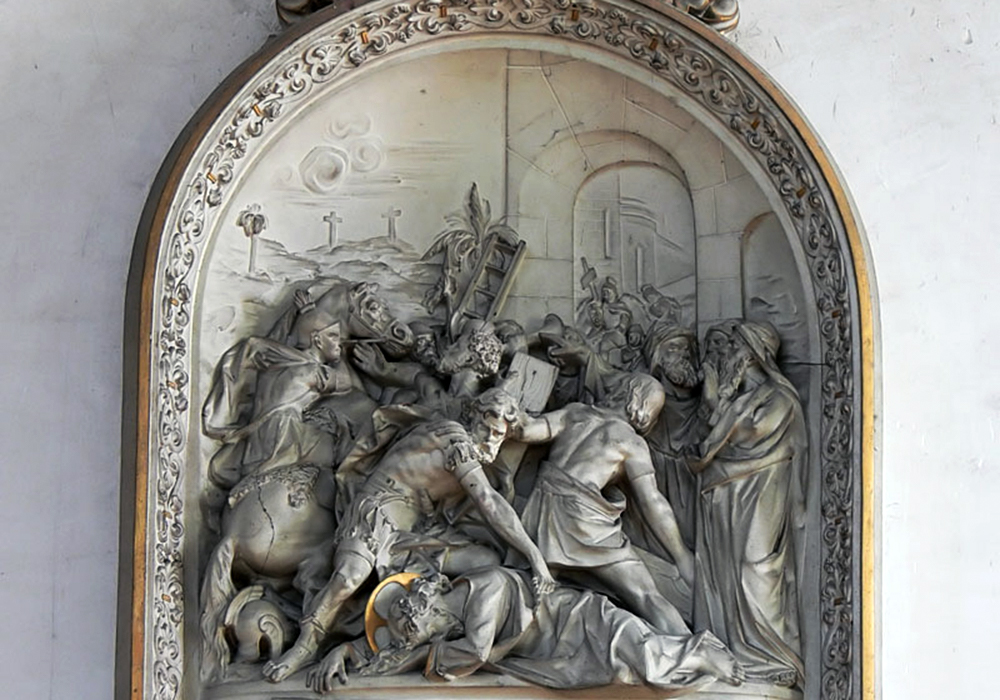
(Meditation by a prisoner)
It is good for a man that he bear the yoke in his youth. Let him sit alone in silence when he has laid it on him; let him put his mouth in the dust – there may yet be hope; let him give his cheek to the one who strikes him, and be filled with insults. For the Lord will not cast off forever, but, though he cause grief, he will have compassion according to the abundance of his steadfast love (Lam 3:27-32).
Falling down is never pleasant; but beyond the fact that it is unpleasant, falling over and over again becomes itself a kind of condemnation, as if one is no longer capable of remaining standing. As a man, I have fallen all too many times: I have also gotten up many times. In prison I often think about how many times a child falls to the ground before learning to walk: I am coming to think that these are preparations for all the times when we will fall as adults. As a child, my home was like a prison: I lived in fear of punishment, alternating between the melancholy of adults and the carefreeness of children. Of those years I remember Sister Gabriella, the only happy image: she was the only one who saw the best in me. Like Peter, I have sought and found many excuses for my mistakes: the strange fact is that a fragment of goodness always remained alive in me.
I became a grandfather in prison: I didn’t experience my daughter’s pregnancy. One day, I will tell my granddaughter the story of only the goodness I have found and not the evil I have done. I will tell her about the one who, when I lay fallen on the ground, brought me the mercy of God. In prison, the worst form of despair is to think that life no longer has meaning. It is the greatest suffering: of all the lonely people in the world, you feel like the loneliest. It is true that my life was shattered into a thousand pieces, but the wonderful thing is that those pieces can still be put together. It is not easy, but it is the only thing that still makes sense here.
Lord Jesus, you fall a third time to the ground and, when everyone thinks that this is the end, once again you get up. We confidently put ourselves in the hands of your Father and entrust to him all those who feel imprisoned in the abyss of their errors, so that they may be granted the strength to get up and the courage to let themselves be helped.
Let us pray.
O God, strength of those who hope in you, you give peace to those who follow your teachings. Sustain our staggering steps, raise us when we fall through our unfaithfulness. Pour the balm of consolation and the wine of hope on our wounds. Through Christ our Lord. Amen.
Tenth Station
Jesus is stripped of his garments
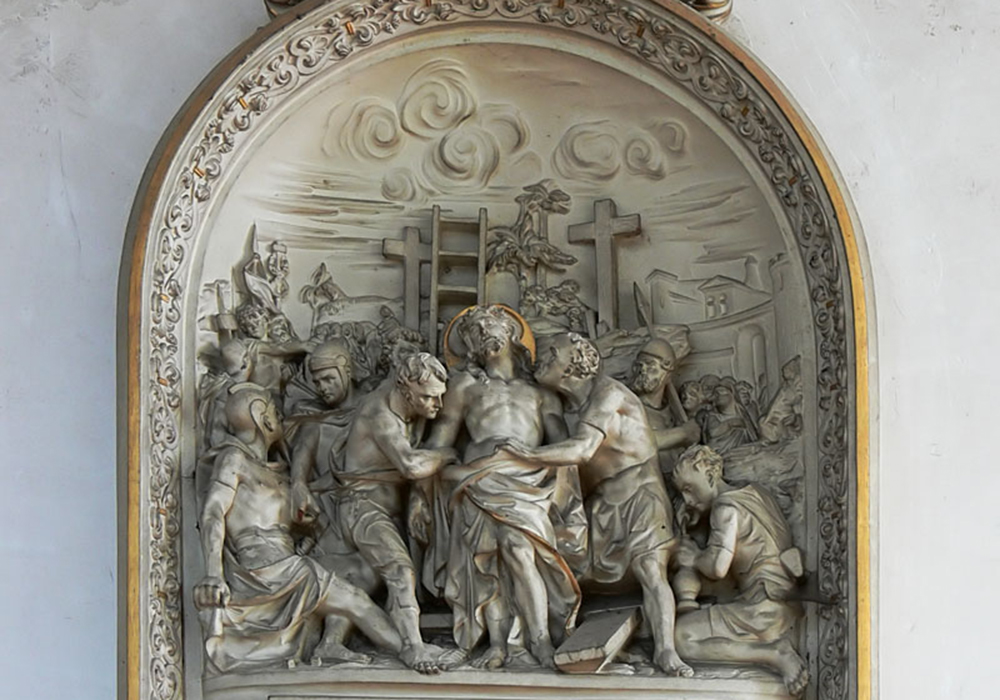
(Meditation by a prison teacher)
When the soldiers had crucified Jesus they took his garments and made four parts, one for each soldier; also his tunic. But the tunic was without seam, woven from top to bottom; so they said to one another, “Let us not tear it, but cast lots for it to see whose it shall be.” This was to fulfill the Scripture, “They parted my garments among them, and for my clothing they cast lots” (Jn 19:23-24).
As a teacher in a prison, I see people entering jail deprived of everything: stripped of all dignity because of the crimes they have committed, stripped of all respect for themselves and for others. Every day I see how they become more and more dependent behind bars: they need me even to help write a letter. These are the unsettled lives entrusted to my care: helpless, frustrated by their weakness, frequently deprived of even the ability to understand the wrong they have done. At times, however, they are like newborn babies who can still be formed. I sense that their lives can start over in another direction, definitively turning away from evil.
My strength, however, is fading day by day. Encountering daily all this anger, pain and hidden malice ends up wearing down even the most experienced of us. I chose this work after my mother was killed in a head-on collision by a young drug addict: I decided to respond immediately to that evil with good. But even though I love this job, I sometimes struggle to find the strength to carry on.
In so sensitive a service, we need to feel that we are not abandoned, in order to be able to support the many lives entrusted to us, lives that each day run the risk of ruin.
Lord Jesus, when we gaze at you stripped of your garments we feel embarrassed and ashamed. Beginning with the first man, in the face of the naked truth we started to run away. We hide behind masks of respectability and clothe ourselves with lies, frequently with the threadbare rags of the poor, exploited by our greedy thirst for money and power. May the Father have mercy on us and patiently help us to become more simple, more transparent, more authentic: ready to abandon definitively the weapons of hypocrisy.
Let us pray.
O God, you set us free by your truth. Strip us of our interior resistance and clothe us with your light, that we may be the reflection of your glory in the world. Through Christ our Lord. Amen.
The Eleventh Station
Jesus is nailed to the Cross
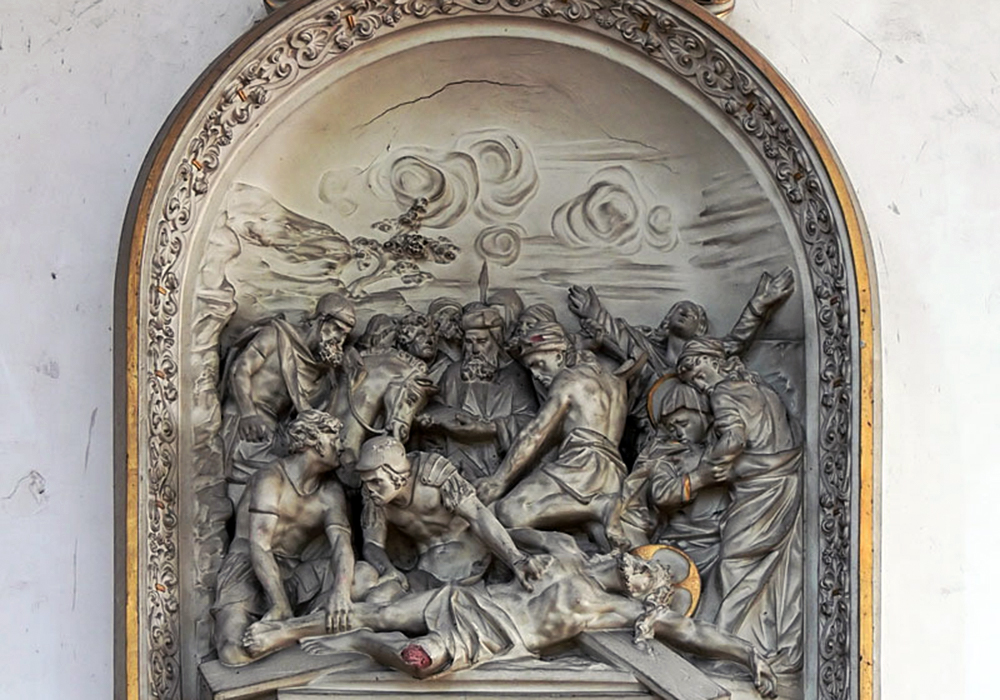
(Meditation by a priest accused and later acquitted)
When they came to the place which is called The Skull, there they crucified him, and the criminals, one on the right and one on the left. And Jesus said, “Father, forgive them; for they know not what they do”. And they cast lots to divide his garments. And the people stood by, watching; but the rulers scoffed at him, saying, “He saved others; let him save himself, if he is the Christ of God, his Chosen One!” The soldiers also mocked him, coming up and offering him vinegar, and saying, “If you are the King of the Jews, save yourself!” There was also an inscription over him, “This is the King of the Jews”. One of the criminals who were hanged railed at him, saying, “Are you not the Christ? Save yourself and us!” But the other rebuked him, saying, “Do you not fear God, since you are under the same sentence of condemnation? And we indeed justly; for we are receiving the due reward of our deeds; but this man has done nothing wrong”. And he said, “Jesus, remember me when you come in your kingly power”. And he said to him, “Truly, I say to you, today you will be with me in Paradise”(Lk 23:33-43).
Christ nailed to the Cross. How often, as a priest, have I meditated on this page of the Gospel. When later, one day, they put me on a cross, I felt the full weight of that wood: the accusation was made in words as hard as nails, the ascent became steep, suffering weighed me down. The darkest moment was seeing my name pasted outside the courtroom: at that moment I realized that I was a guiltless man forced to prove his innocence. I hung on the cross for ten years: my Way of the Cross was populated with dossiers, suspicions, accusations, insults. Each time I was in the courtroom, I looked for the crucifix: I kept my eyes fixed on it as the law investigated my story.
For a moment, shame led me to think that it would be better to end it all. But then I decided to remain the priest I always was. I never thought of lessening my cross, even when the law permitted it. I chose to submit myself to a regular trial: I owed it to myself, to the young men I taught during the years at the seminary, to their families. While I was climbing my Calvary, I found them all along the way: they became my Cyreneans, they bore the weight of the cross with me, they dried my many tears. Together with me, many of them prayed for the young man who accused me: they never stopped. The day on which I was fully acquitted, I found myself happier than I had been ten years before: I experienced first-hand God working in my life. Hanging on the cross, I discovered the meaning of my priesthood.
Lord Jesus, the love you showed us to the end led you to the cross. Dying, you still forgive us and give us life. We entrust to your Father all those innocent men and women who throughout history have suffered unjust condemnation. May your words resound in their hearts: “Today you will be with me in Paradise”.
Let us pray.
O God, source of mercy and forgiveness, who reveal yourself in the sufferings of humanity, enlighten us with the grace that flows from the wounds of the Crucified One and grant us perseverance in faith throughout the dark night of trial. Through Christ our Lord. Amen.
The Twelfth Station
Jesus dies on the Cross

(Meditation by a civil magistrate)
It was now about the sixth hour, and there was darkness over the whole land until the ninth hour, while the sun’s light failed; and the curtain of the temple was torn in two. Then Jesus, crying with a loud voice, said, “Father, into your hands I commit my spirit”. And having said this he breathed his last(Lk 23:44-46).
As a civil magistrate, I cannot crucify a man, any man, to the sentence he is serving: that would mean sentencing him a second time. He has to pay for the wrong he did: not to do so would mean trivializing his crimes, justifying the intolerable actions he carried out that caused physical and moral suffering to others.
True justice, however, is possible only through a mercy that does not crucify an individual for ever, but becomes a guide in helping him to get up and to realize the goodness that, for all the wrong he has done, is never completely extinguished in his heart. Only by finding his own humanity again will the convicted person be able to see himself in others, in the victim to whom he caused such pain. As much as his path of rebirth can be tortuous and the risk of falling back into evil remains always present, there is no other way to try to rebuild his own personal and communal history.
The severity of a sentence puts a person’s hope to a hard test: it helps him to reflect and question whether the reasons for his actions might become an opportunity to consider himself from another perspective. To do this, though, he has to learn how to recognize the person hidden behind the crime committed. In this process, it sometimes becomes possible to glimpse a horizon that can instil hope in that person and once his sentence has been served, to return to society and hope that people will welcome him back after having rejected him.
For all of us, even those convicted of a crime, are children of the same human family.
Lord Jesus, you died as the result of a corrupt conviction, handed down by unjust judges terrified by the irrepressible force of the Truth. We entrust to your Father all magistrates, judges and lawyers and ask that they may be upright in carrying out their service to the State and its citizens, especially those who suffer the effects of poverty.
Let us pray.
O God, King of justice and peace, you heard in the cry of your Son the cry of all humanity. Teach us not to identify the person with the wrong he has done and help us to see in everyone the living flame of your Spirit. Through Christ our Lord. Amen.
The Thirteenth Station
Jesus is taken down from the Cross
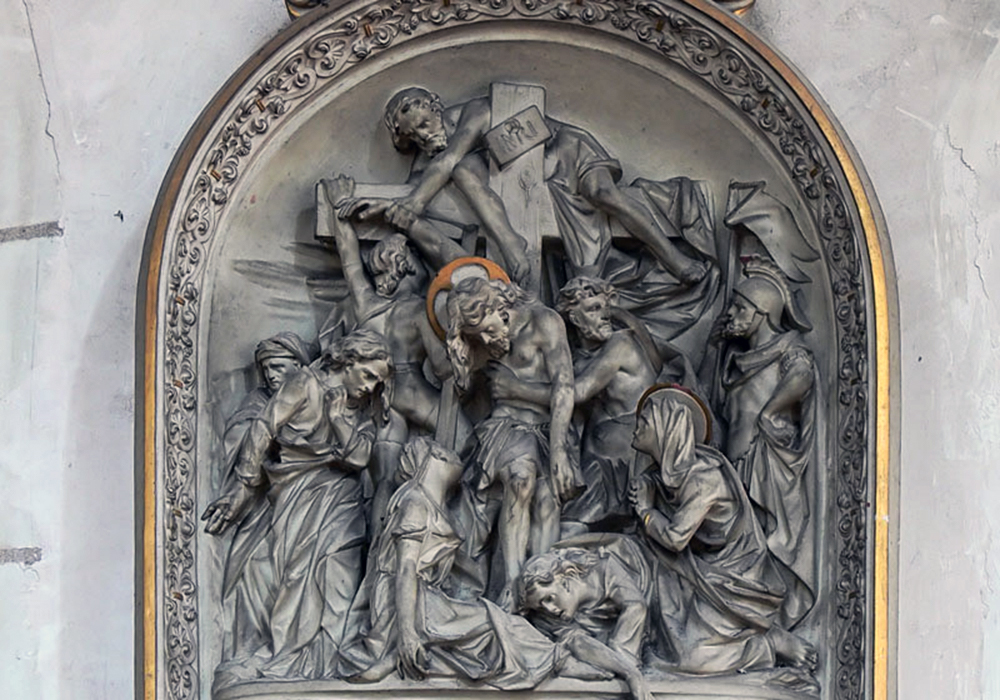
(Meditation by a volunteer religious Brother)
Now there was a man named Joseph from the Jewish town of Arimathea. He was a member of the council, a good and righteous man, who had not consented to their purpose and deed, and he was looking for the kingdom of God. This man went to Pilate and asked for the body of Jesus. Then he took it down and wrapped it in a linen shroud, and laid him in a rock-hewn tomb where no one had ever yet been laid (Lk 23:50-53).
Prisoners have always been my teachers. Sixty years ago, I went into prisons as a volunteer friar and I have always blessed the day when, for the first time, I encountered this hidden world. Seeing their faces, I came to realize with clarity that I could have been in their place, had my life taken a different direction. We Christians frequently fall into the illusion of feeling that we are better than others, as our care for the poor allows us to stand as judges of others, condemning them as many times as we want, without any appeal.
In his life, Christ willingly chose to take his stand with the least: he travelled the forgotten peripheries of the world in the midst of thieves, lepers, prostitutes, scoundrels. He wanted to share the experience of poverty, solitude, anxiety. I have always thought that that was the real meaning of his words: “I was in prison and you came to visit me” (Mt 25:36).
Passing by one cell after another, I see the death that lives within. Prison continues to bury individuals alive: theirs are stories that no one wants to hear any longer. Each time, Christ says to me again: “Keep going, don’t stop. Take them in your arms again”. I cannot help but listen to him: even within the worst of persons, he is always there, however obscured is their memory of him. I just need to halt my hectic pace, stop in silence before those faces marred by evil and listen to them with mercy. This is the only way I know to accept that person, and avert my gaze from the mistake he made. Only in this way will he be able to trust and regain the strength to surrender to God’s goodness, and see himself differently.
Lord Jesus, your body, disfigured by such great evil, is now wrapped in a shroud and consigned to the bare earth: here is the new creation. To your Father, we entrust the Church, born from your pierced side, that she may never give up in the face of failure and appearances, but persevere in bringing to all the joyful message of our salvation.
Let us pray.
O God, beginning and end of all things, in the Passover of Christ you redeemed all humanity. Grant us the wisdom of the Cross that we may abandon ourselves to your will with a spirit of joy and gratitude. Through Christ our Lord. Amen.
The Fourteenth Station
Jesus is laid in the tomb
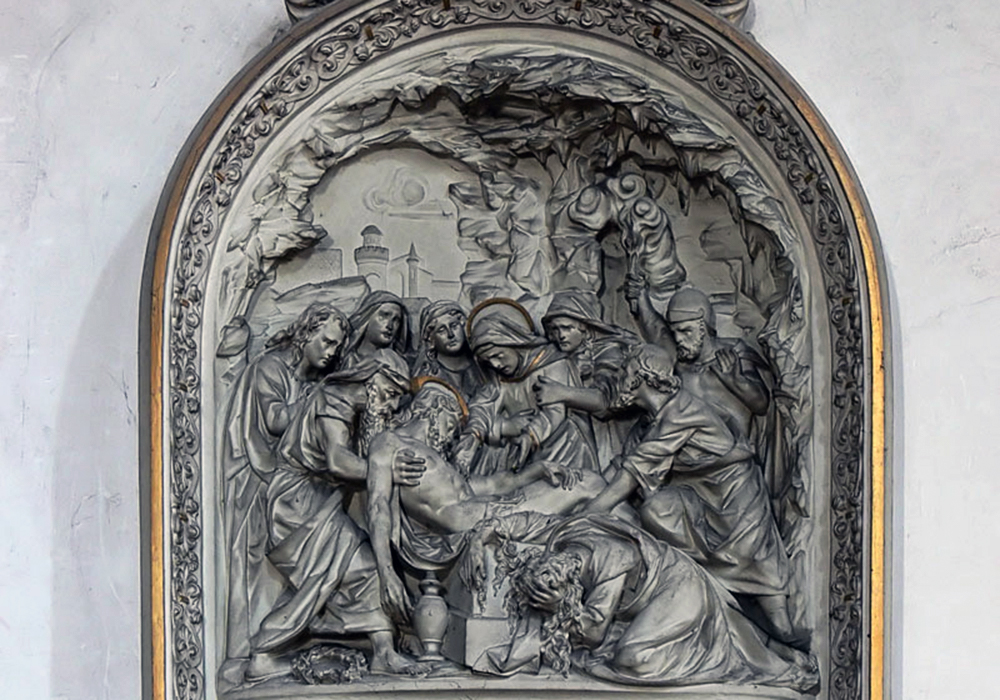
(Meditation by a corrections officer)
It was the day of Preparation, and the sabbath was beginning. The women who had come with him from Galilee followed, and saw the tomb, and how his body was laid; then they returned, and prepared spices and ointments. On the sabbath they rested according to the commandment (Lk 23:54-56).
In my mission as a corrections officer, every day I experience first-hand the suffering of those who live in prison. It is not easy to be faced with someone who yielded to evil and inflicted immense harm on others and their lives. In prison, an attitude of indifference can create even further harm in the history of someone who has failed and is paying his debt to justice. A colleague, who was my mentor, frequently repeated: “Prison changes you: a good person can become a sadistic one. An evil person can become better”. The result also depends on me and a firm resolution is essential for achieving the goal of our work: that of offering another possibility to someone who did wrong. To attempt this, I cannot limit myself to opening and closing a cell, without doing this with a touch of humanity.
By respecting each person’s tempo, human relations can once more flourish little by little within this oppressive world. It happens through gestures, attitudes and words that can make a difference, even if spoken in a low voice. I am not ashamed to exercise the permanent diaconate in wearing the uniform of which I am proud. I know suffering and despair: I experienced them as a child. My small wish is to be a point of reference for those I encounter behind bars. I work hard to keep hope alive in people left to themselves, frightened at the thought of one day leaving and possibly being rejected yet again by society.
In prison, I remind them that, with God, no sin will ever have the last word.
Lord Jesus, once more you are in the hands of men, but this time, they are the loving hands of Joseph of Arimathea and some pious women from Galilee, who know that your body is precious. Their hands represent the hands of all who never tire of serving you and making visible the love of which human beings are capable. It is this love that makes us hope in the possibility of a better world. We need only be willing to let ourselves be met by the grace that comes from you. In prayer, we entrust to your Father, in a particular way, all prison guards and all those who work in various capacities in prisons.
Let us pray.
O God, eternal light and endless day, fill with your blessings those who devote themselves to your praise and to the service of those who suffer in the countless places of human pain and sorrow. Through Christ our Lord. Amen.
